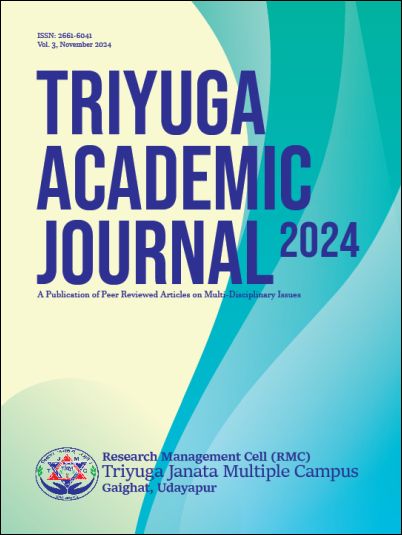Navigating the Anti-war Poetry of Santosh Kumar Pokharel
DOI:
https://doi.org/10.3126/taj.v3i1.71978Keywords:
anti-war poetry, critical stylistic perspective, doctrine of meliorism, Pokharel’s attitude to warAbstract
The world is now passing through its most critical stage of its existence as the clouds of genocidal war are hovering over the world-horizon. Humans are living in terror and trepidation under the ominous shadow of carnage. The world has already witnessed the devastating and destructive, calamitous and disastrous sides of the two World Wars. The tragedy a war brings in its wake is alarming: a trail of death, destruction and obliteration in such varied forms as disease, famine and starvation, and poverty, mass suffering, ruin and trauma. Grief and tears, deprivation and helplessness remain the daily food of the commoners in post-war dispensation. The war inflicts a grave psychological pain and wound on the surviving individuals. The war, thus- whenever it breaks out –dances its macabre death to the utter detriment of humanity at large! Therefore, this paper aims at investigating the anti-war poetic contribution of an international multi-lingual poet from Nepal, Santosh Kumar Pokharel. The research article is divided into three sections. First, it presents, in brief, the history of the practice of war- poetry writing in the world literature. The study then in the second place moves on to provide a perspective on the very goal and definition of anti-war poetry. Thirdly, it attempts to elaborately and extensively examine its main objective that lies in presenting a critical analysis of some of his anti-war poems, and thereby determining his status as an anti-war poet in final.
Downloads
Downloads
Published
How to Cite
Issue
Section
License
Copyright (c) 2024 Triyuga Janata Multiple Campus

This work is licensed under a Creative Commons Attribution-ShareAlike 4.0 International License.
© Triyuga Janata Multiple Campus




